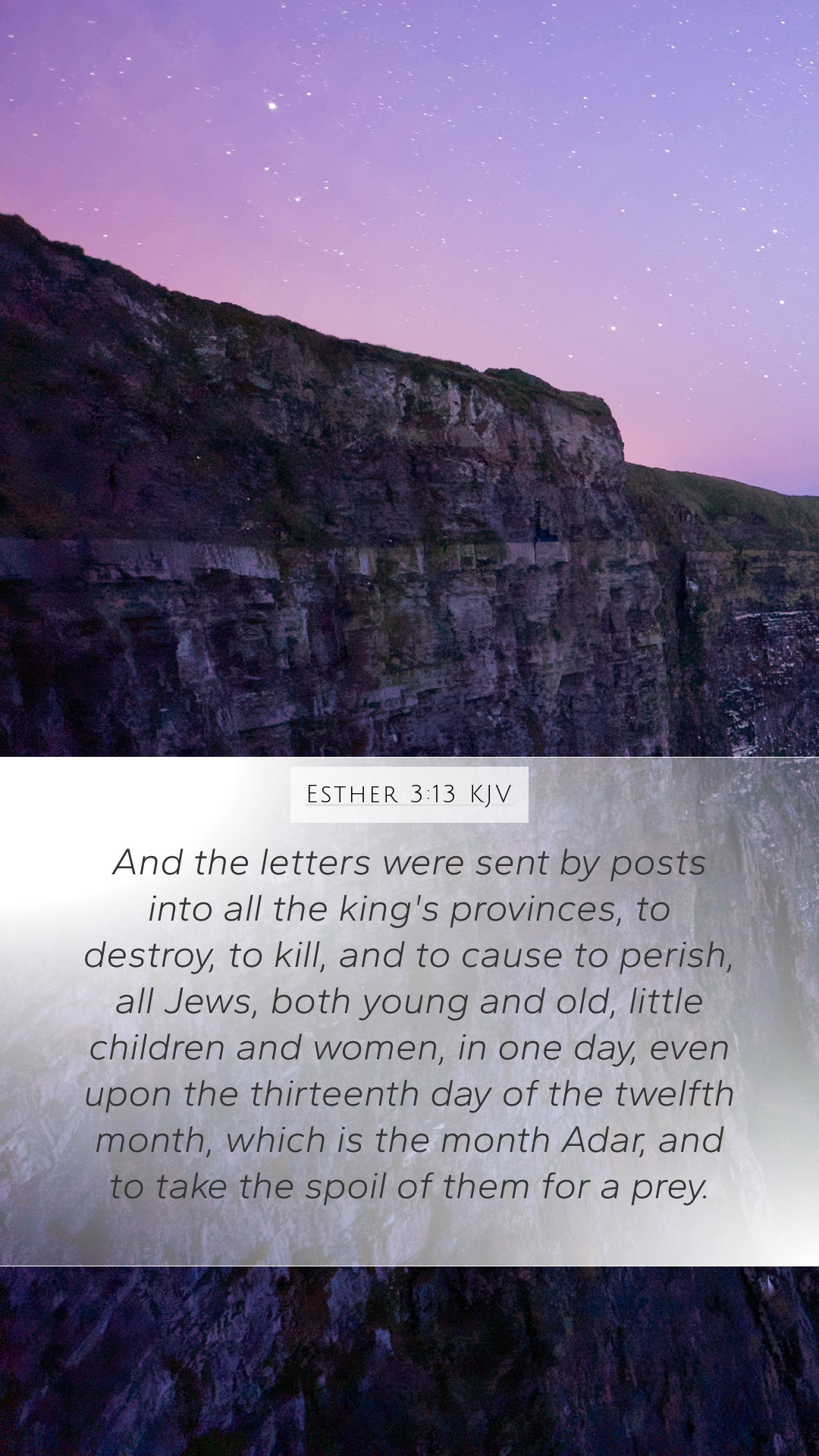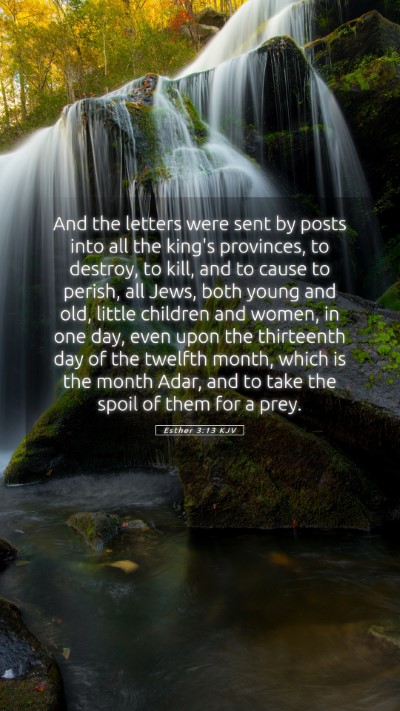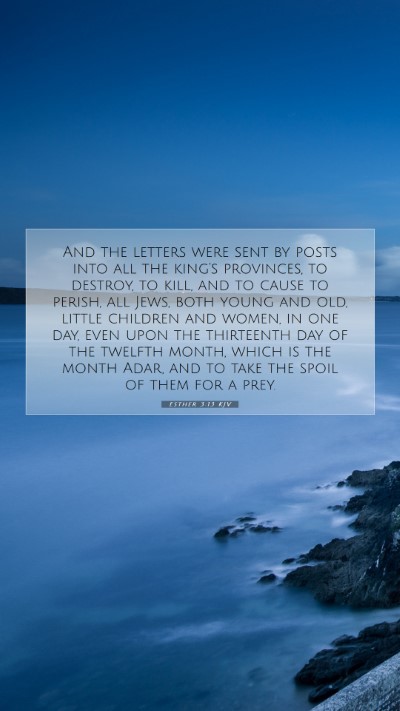Old Testament
Genesis Exodus Leviticus Numbers Deuteronomy Joshua Judges Ruth 1 Samuel 2 Samuel 1 Kings 2 Kings 1 Chronicles 2 Chronicles Ezra Nehemiah Esther Job Psalms Proverbs Ecclesiastes Song of Solomon Isaiah Jeremiah Lamentations Ezekiel Daniel Hosea Joel Amos Obadiah Jonah Micah Nahum Habakkuk Zephaniah Haggai Zechariah MalachiEsther 3:13 Meaning
What is the meaning of Esther 3:13?
And the letters were sent by posts into all the king's provinces, to destroy, to kill, and to cause to perish, all Jews, both young and old, little children and women, in one day, even upon the thirteenth day of the twelfth month, which is the month Adar, and to take the spoil of them for a prey.
Esther 3:13 Bible Verse Meaning
Bible Verse Commentary on Esther 3:13
Esther 3:13: "And the letters were sent by posts into all the king's provinces, to destroy, to kill, and to cause to perish, all Jews, both young and old, little children and women, in one day, even upon the thirteenth day of the twelfth month, which is the month Adar, and to take the spoil of them for a prey."
Understanding Esther 3:13
Esther 3:13 reveals a crucial moment in the Book of Esther, highlighting the impending doom faced by the Jewish people during the reign of King Ahasuerus. This verse encapsulates the essence of Haman's plot against the Jews and the urgency of the situation described in the narrative.
- Decree Against the Jews: Haman's letters dictate a brutal fate: the systematic destruction of the Jews. This act highlights the extreme prejudice and hatred faced by the Jewish people.
- The Role of Messengers: The mention of "posts" underscores the swift and far-reaching communication within the empire, demonstrating Haman's power to enact his wicked plans over vast territories.
- The Timing of the Decree: The specificity of the date— the thirteenth of Adar—indicates a well-planned strategy. According to Jewish tradition, this day would later be celebrated as a festival of deliverance (Purim), showcasing God's sovereignty over seemingly dire circumstances.
Bible Verse Meanings and Interpretations
Commentators such as Matthew Henry, Albert Barnes, and Adam Clarke provide valuable insights into the deeper meaning of this verse:
- Matthew Henry: Henry observes the brutal nature of the decree and the comprehensive agenda against the Jews. He reflects on the oppression they faced as a marginalized group, encapsulating the overarching theme of divine protection and intervention that characterizes the Book of Esther.
- Albert Barnes: Barnes emphasizes the political machinations at play, pointing out that Haman's influence and malice are emblematic of the greater trials and tribulations faced by God’s chosen people throughout history.
- Adam Clarke: Clarke focuses on the historical context, noting the implications of such a ruthless decree, which not only intended to kill but also to strip the Jews of their possessions, highlighting the cruelty and avarice that often accompany persecution.
Historical Context & Significance
The events of Esther 3:13 occur within the Persian Empire, a time of significant tension between the Jews and their oppressors. Understanding the historical context enriches our comprehension of the pervasive anti-Semitism depicted in this verse. The decree is not just a local affair but has broader implications for understanding the plight of the Jewish people during exile.
This narrative foreshadows themes of faith, bravery, and the possibility of redemption, as it sets the stage for Esther's courageous intervention, which is pivotal in the fate of her people.
Application and Reflections
Esther 3:13 serves as a poignant reminder of the importance of standing up against injustice and the personal risks involved. As we reflect on this verse, we are encouraged to consider how we respond when faced with societal evil and persecution. It also serves as a testament to the belief in divine justice and protection even amid great peril.
Additionally, for those engaged in Bible study groups or engaging in online Bible study, this verse can lead to discussions about faith under duress, the importance of seeking justice, and the role of individuals in the broader narrative of redemption.
Cross References
This verse resonates with several other passages that reflect themes of persecution and divine deliverance:
- Exodus 17:8-16: The Amalekites' attack on God's people and His promise of future vengeance.
- Psalms 74:8-9: Discusses the destruction of God's sanctuary and the plight of His people.
- Isaiah 54:17: A promise that no weapon formed against God's people shall prosper.
Conclusion
In conclusion, Esther 3:13 encapsulates a moment of profound reflection within the Biblical narrative. It not only outlines a dire situation but also sets the stage for themes of faith, courage, and the sovereignty of God. Through the insights of various commentaries, we gain a deeper understanding of its implications, both historically and spiritually.
For anyone seeking Bible verse meanings, interpretations, and understanding Scripture, this verse serves as an essential study topic, encouraging both personal and communal reflection on the nature of faith in the face of adversity.


